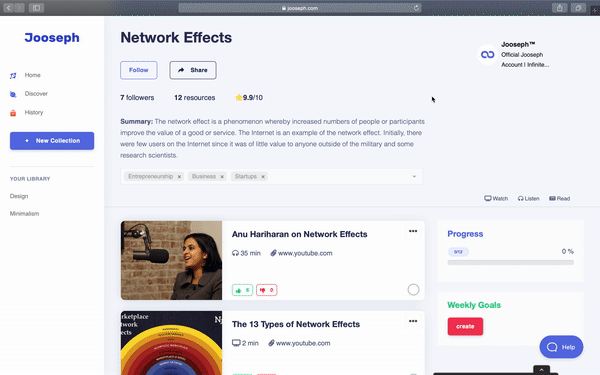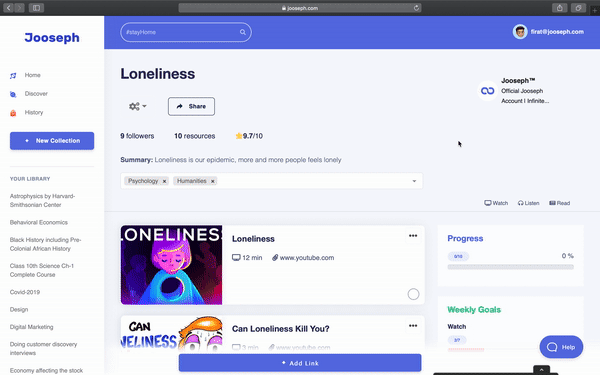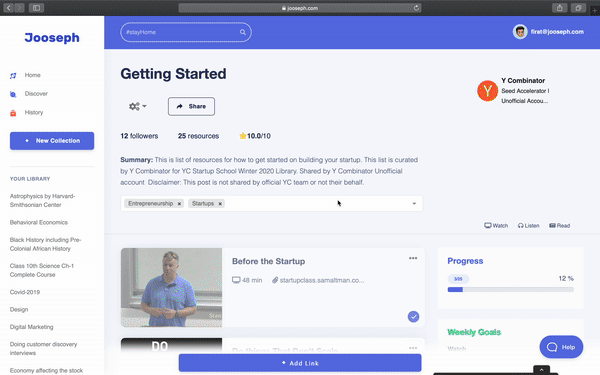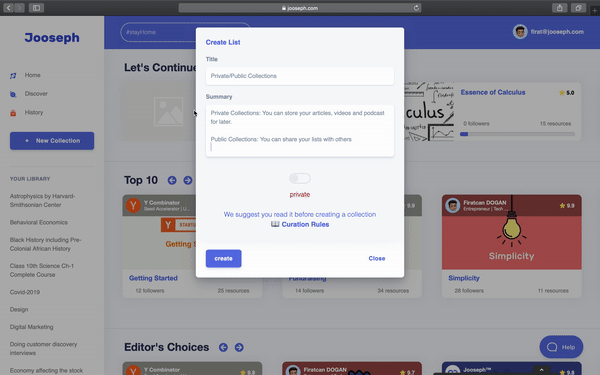Making The Internet Your Learning Hub
Original Post: Making The Internet Your Learning Hub
In Jooseph, We believe there is an easier way to learn online; instead of spending all your time on searching for great resources, we want you to find them in a glance and learn anything without any noise. While we are focused on improving Jooseph, we are sharing every update and iteration, weekly, with our users. We want our users to know what we build for them and we want them to tell us how we can make their lives better.
While we are sharing our weekly updates via email, I realized there are tons of insights and experiences in them. There are a lot of people trying to take off their ideas who can really benefit from our mistakes and experiences, maybe we can save a lot of time for them by sharing our experiences and product updates. Also, I believe there are a lot of smart people who believe our cause and are willing to help us to solve their problems.
So, we have decided to share weekly or biweekly updates about our product and learnings. First of all, I will not give advice because I am not in a position to give you any advice about startups but instead I will try to explain what we have gone through so you can interpret yourself and maybe can find hints for your own journey. Also, I’ll explain which data or feedback take us to build these features you can play around with.
I know that probably there will be a lot of misinterpretation from us which makes us build unnecessary tools. So I’ll try to explain the features that didn’t work out.
Since this is the first post I am writing about our product, I would like to start with the foundation of Jooseph. The problem we had, how we are trying to solve it and the first couple of iterations.
Everything on SEO Steroids##
This was the initial point when we realized it was so hard to find great, high quality resources in the internet today. It’s not because there isn’t enough content out there but the exact opposite, there is too much content out there and people are constantly trying to write fluff content that is irrelevant to the topics or just mediocre. This is why I am warning you right now; it’s a post about mostly our product and insights, it’s not a post about product management or whatsoever.
However, day by day I am seeing more irrelevant search results when I am trying to learn something. Especially when I am just starting out on a subject, it’s much harder to find great resources because most of the time I don’t know the keywords and subtopics. We have realized that in daily life when we encounter this problem, we tend to ask our peers. For instance, if you want to learn “Product Market Fit” and you know nothing about it, {Insert a John Snow}, you tend to ask for a suggestion from a friend who knows the topic.
Inspiration of this analogy, let us to start building a directory that you can follow and share curated collections of different resources about subjects. Now, you can just find a “Product-Market Fit” collection and start exploring it.
I Shall Like or Dislike
First of all, we did know that we can’t just build a website, share with the world and expect everyone to act civilized. We know there will be people who are going to spam and only share their content. We didn’t want that to happen. Also, if this thing will help you to find great resources you should understand which ones are great and which ones are not in a glance.
We realized there should be rankings for each collection, therefore we have builded likes and dislikes which works as a ranking. Instead of rating each module, you can like or dislike any content inside of a collection and it’ll affect overall ranking of the collection.

Why do we build this kind of system instead of just ranking for the overall collection? We know that evaluating overall collection could be hard, misinterpreted or biased because of human memory . Also, it can be misused.
On the other hand, just liking or disliking content that you have just consumed is much more natural than trying to evaluate the whole collection that you started two weeks ago.
Who Am I
In the end we are a new platform that nobody knows, there is absolutely a problem of trust right. It’s normal to think, how can I know these resources are better than the ones I could find myself for the first time users.What they were trying was to click user profiles but we have focused only on collections so there weren’t any user profiles.
We asked couple of our users, why they want to click the user profiles, first of all they want to see other collections of the curators and they want to know who they are.Therefore, we have started to build users’ profiles, now you can enter someone’s profile and check their curations.

We are still dealing with the trust problem like other entrepreneurs as well. It’s an initial problem for most of the products, there are couple great examples such as AirBnb’s design for trust. They made joint research with Stanford in 2015 which you can find here. Research suggests that similarity is the main reason which creates trust but reputation surpasses similarity in creating trust. For instance, you will be more likely to trust people like you but if you see 10 references about an unsimilar person and 5 references for a similar person, you’ll choose the unsimilar candidate. We didn’t have any experience on this but this is the initial reason.
Store Your Links and Organize Them
The internet is our new library but it’s so messed up that we have to organize it. We can’t use it like this for long. We found out that our users have things to read, watch or listen they stored for later. Not all of them want to share their links, sometimes they just want to save the resources they found earlier or create their own list out of the resources they found on Jooseph.

Therefore, we have created private, public and collaborative(next week) collections. Also, our community uses us to find great resources and we don’t want them to waste their time on useless collections. So, every collection is private now and if someone wants to share their collections, they have to be verified curators. We believe this will increase the quality of the collections shared on the platform and make our users’ lives easier.

On the other hand, you can invite your friends or colleagues to your collaborative collection. Collaborative collections let you work with others, you can decide whether they can edit or not. If you want you can just share your collections with your students or you can let your colleagues edit your collections so you can work on together.*
*This will be online next week.
Embed them all or not at all!
When we realized that there were a lot of people dropping off after clicking links (Isn’t it the point…). We asked ourselves, how we can reduce drop-offs. Our initial idea was let’s create an embedded section where users can see the content inside of the platform. This would obviously reduce drop-offs.
What happened was the exact opposite, people started dropping-off faster than ever and drop-off rates increased. Everyone started dropping-off after first resource clicks, which before was after fourth or fifth resource clicks. We realized people were coming here to find new resources not consuming them inside, maybe not yet.
So, we interpret that it was normal for them to drop-off but the important thing was whether they are coming back or not. In that 2 week period with embedded resources our retention rate decreased too.
Hit the wall
Last week, We were trying so hard to build new things that we didn’t realize we were off track. Jooseph is here to help you learn new things and find great content without encountering time wasting stuff on all over the web. Our software has no value without our lifelong learner community and great collections in it.
Forgetting about the value you’re creating and just focusing on your KPI’s can mislead you. They should go hand by hand. We experienced that from the first hand, we have shifted our focus on drop-offs and other things instead of enhancing great learning experience and high quality content. It doesn’t mean they are not important but our focus should be on the quality and relevancy of our curations.
That being said, from first hand experience, you have to focus on the value you’re creating. We are right back on the track and creating the best value we can by focusing on finding great resources and creating a more organized, less noisy library for you.
Jooseph is a place where you can follow, share and store collection of links for learning. You can find great list of resources for the subjects you have been waiting for to learn or just simply share your favorite content to help others.
Create an account now

Great post! Keep up the great work.
Thank you very much you too, waiting for yours :)